Terence Stamp, Icon of Swinging London and ‘Superman’ Villain, Dies at 87.
Terence Stamp, the actor who became the face of the Swinging London moment during the 1960s, died Sunday, his family told Reuters. He was 87. Stamp shot to recognition when he played the title character in the 1962 film “Billy Budd.”
Directed by Peter Ustinov, who also acted in the film, the black-and-white adaptation of the Melville novella brought Stamp his only Academy Award nomination, for best supporting actor. The rest of the decade saw him in a remarkable string of films, including John Schlesinger’s “Far From the Madding Crowd” and Ken Loach’s debut feature, “Poor Cow.”
PLEASE FIND RELATED STORIES! Bobby Whitlock, Derek and the Dominos Co-Founder, Dies at 77 — Rock World Mourns a Legend.
CNN has contacted his representatives for verification of the news.
A star forged in the gritty surroundings of London’s East End, Terence Stamp was born on July 22, 1938, the son of Ethel, a local housewife, and Thomas, a merchant seaman.
In a telling 2013 chat with the British Film Institute, Stamp recalled how his father tried to steer him away from the stage and screen. “He really thought people like us weren’t cut out for it,” Stamp said, then added with a quiet smile, “but my mother adored the whole thing.”
He added: “Looking back, she must have carried the dream for herself and disguised it as encouragement. Dad, the family’s keeper, never really opened up—too much of his era, I suppose. He’d scraped his way up the harbour and the hold, shoveled coal and knew that showing feeling in a cramped cabin came across as vulgar.”
Terence Stamp would soon stride through the 1960s like a sudden London fog, his name shimmering alongside Jean Shrimpton, Julie Christie—his Bathsheba in “Far from the Madding Crowd”—and the restless glamour of Brigitte Bardot. He tried marriage in 2002, wed to an Australian chemist 35 years his junior, but the verdict, according to the Guardian, was a quiet six years.
Stamp once shared a cramped London flat with Michael Caine, then a fellow young actor, both of them juggling auditions and bills. When Caine’s star caught fire, Stamp didn’t. He acknowledged in a 2015 Guardian chat that they drifted. “We had the same postcode, then we didn’t.
He was five years older and wiser, no question. He learned how to walk a tightrope of commercial sense and craft; I was still checking which foot to start on. “Caine taught me backbone: choose worthy work, be patient, the right projects will knock. The minute the door opened for him, he slammed that rule book shut, hopping from one studio jet to the next.”
A quiet spell followed while Stamp sifted through scripts, then he landed a flying-kick comeback: 1978’s “Superman,” where he glowered as General Zod, a god in chains. Audiences cheered the flair; Stamp repacked the cape for the sequel, smiling just as the crystals glimmered.
Two decades after he first helped birth the cinematic Kryptonite, Stamp voiced Superman’s father Jor-El for the “Smallville” TV series, a casting loop full of winking fate. Between that and his indelible turn as drag queen Bernadette in “The Adventures of Priscilla, Queen of the Desert,” the man has slipped through genres the way light slips through a prism and turns into a rainbow.
When asked about the strange journey—minor masterpieces, mega-budget flicks, even the odd turn in “Wall Street” or “The Adjustment Bureau”—he told the Guardian that ambition has never been his driving engine. Life has handed him disappointed scripts and bruised auditions, and while the love of film sometimes flickers he refuses to throw new batteries in.
“It just resurrects itself,” he says, as if love were a stray cat that shows up on the balcony. There is no daily pep talk for him, no sky-high salary that stitches him to the alarm clock. The margin between paycheck and calling is a thin line he has crossed with quiet grace.
Sure, he has starred in things best left in the discount-bin light of day, but that was sometimes to meet the landlord’s gaze. The rent can now breathe, and so can he—ready to step onto the stage again and, for the sixth decade, do the best he can.

